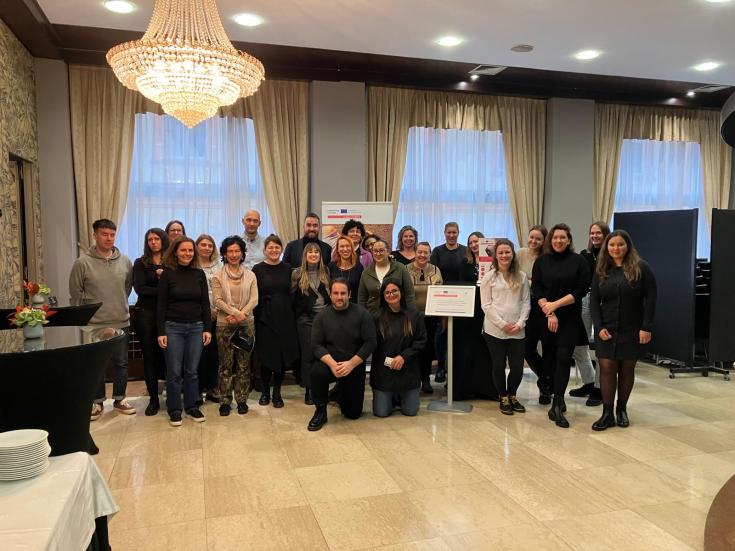Support and Training for NEETs: Insight from Ljubljana's ITW
On November 12th – 13th, the Employment Service of Slovenia, a partner in the atWork4NEETs project, hosted a two-day International Training Workshop event in Ljubljana. The event brought together over 50 participants from 21 organizations from Slovenia, Malta, Luxembourg, Lithuania, Croatia, Italy and Romania, including international project partners and key stakeholders.
The focus: sharing best practices and fostering collaboration to provide personalized support and training for young people not in education, employment, or training (NEET).
Key Highlights from the Event
On November 12th, the event kicked off with opening remarks by Greta Metka Barbo Škerbinc, Director General
of the ESS, and Urška Kovač Zlobko, Youth Guarantee Coordinator at MoLFSA. A keynote
presentation by Veerle Miranda, Head of Youth and Diversity Policies at the OECD, titled
“Creating Better Opportunities for Young People,” set the tone for the discussions. It
covered:
- NEET statistics across various countries, including their social and economic challenges.
- The importance of active labour market policies (ALMPs) in supporting youth transitions.
- OECD recommendations for youth policies and insights from the Youth Policy Toolkit.
- Best practices from countries like Denmark, Belgium, Australia, the United Kingdom, and Japan.
Expert Panels Address Key Challenges and Trends
After the opening, the program featured two expert panel discussions moderated by Jana Rožac, a senior advisor and youth expert at the ESS.
Panel 1: Challenges in Personalized Support for NEET Youth
Panelists emphasized the importance of creating a safe and inclusive environment for NEET
youth. Key contributors included:
- Marjan Hartveldt (Luxembourg Employment Service)
- Susan Sant (Ministry for Social Policy and Children’s Rights, Malta)
- Jūratė Kažukauskienė (Employment Services Lithuania)
- Rok Gumzej (Logout, Center for Digital Well-being, Slovenia)
Their insights highlighted the value of realistic goal-setting, step-by-step planning, and
celebrating small victories to build trust and motivation among NEETs.
Panel 2: Training and Cooperation with Gen Z
This session explored the unique expectations of Generation Z, such as flexibility, meaningful
learning opportunities, and work-life balance. Speakers included:
- Vesna Milošević Zupančič, PhD (e-Študentski Servis)
- Ana Klinar (ALMA initiative coordinator, ESS)
- Janez Albert Novak (PLYA mentor, Radovljica Adult Education Center)
- Ilaria Buselli (Tuscany Region)
The panel stressed that understanding these preferences is vital to tailoring support
strategies for NEET youth.
Showcasing Best Practices from 6 countries
In the afternoon of November 12th, sixteen personalized NEET support initiatives from Slovenia, Croatia, Romania, Luxembourg,Malta, Lithuania, and Italy were showcased during and interactive workshop, providing attendees with practical examples to draw inspiration from. This activity was crucial in order to exchange ideas and good practices on personalized support and training for NEETs among partners and stakeholders.
Field Visits and Workshops
On the second day, participants visited Društvo za razvoj odgovornosti Škatelc, where they
witnessed the Project Learning of Young Adults (PLYA) program in action. This study visit represented an opportunity for all the partners, as they could visit and learn about a Slovenian program for young adults directly on the site in which the program is carried out.
After the study visit, a creative workshop led by psychologist Barbara Gogala used clay modelling to help participants develop project indicators and plan future collaborations.
Looking Ahead
This event marked a significant step in advancing NEET support strategies. By fostering
international collaboration and sharing proven methods, the @Work4NEETs project is paving the way for innovative solutions to help young people successfully (re)enter employment, training or education. The connections and insights gained during these two days promise to drive impactful, long-term outcomes for this vulnerable group.
